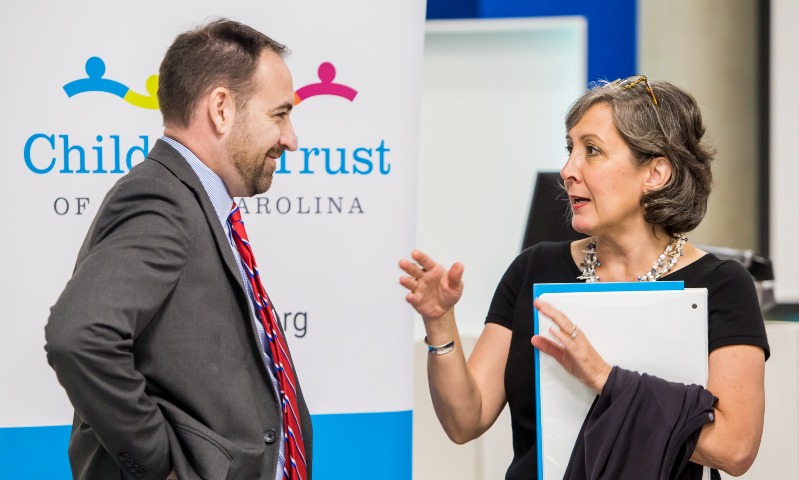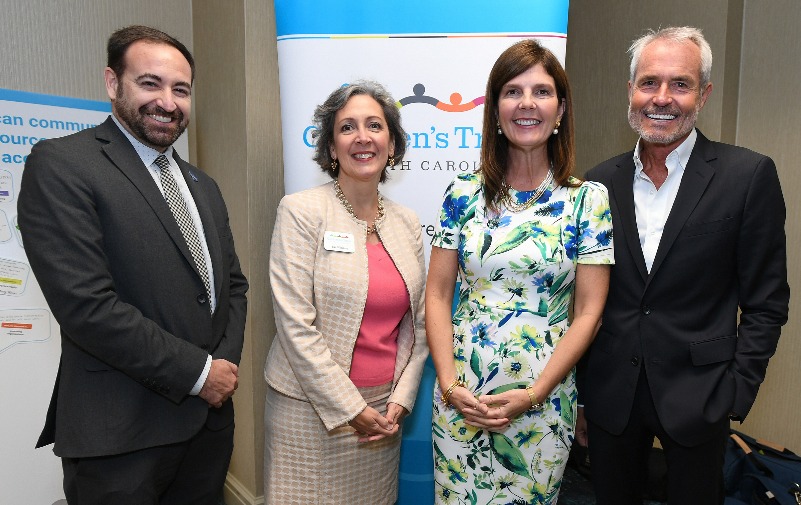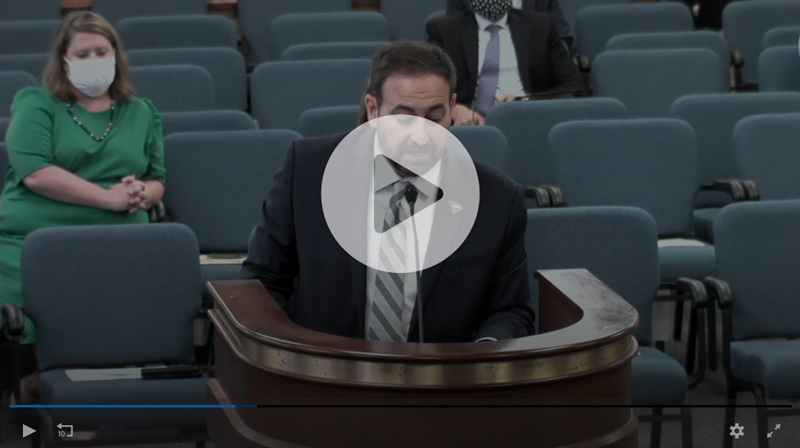The S.C. Department of Social Services works with Children’s Trust to help put evidenced-based prevention programs into place for families and train child-serving professionals. At a recent Senate meeting, Michael Leach, DSS state director, discussed the impact of this relationship.

Michael Leach and Sue Williams discuss child well-being at the 2019 KIDS COUNT annual data book release event.
Michael Leach understands the importance of prevention.
As the state director of the S.C. Department of Social Services, Leach is convinced the safety, permanency and well-being of children is best accomplished on the front end before child abuse and neglect can occur.
Speaking before the state Senate’s Re-Open S.C. Children’s Services/PPE Subcommittee on Aug. 19, he addressed the role that prevention services in communities across the state can play in strengthening families and helping them achieve stability.
“Instead of judging families, we need to collectively search for increasingly sophisticated and proactive ways to treat trauma and address underlying symptoms that may be driving a family’s inability to meet their children’s most basic, fundamental needs,” Leach said. “We need to ask ourselves: How does the community, as a whole, engage and support families to meet needs, especially during school closings when a family’s whole world is having to adapt? How do we build efforts in local communities to build protective factors of families?”
Leach pointed out that families need support more than ever during the COVID-19 pandemic, which has brought about increased stressors for all families. These stressors are compounded in this period of social isolation, which can bring about negative outcomes for children and families. Protective factors can help parents identify and secure resources or learn and master coping strategies that allow them to parent effectively, even under stress.
“We as a collective community need to look for opportunities to grow protective factors for our children and families,” Leach said. “We need communities that are invested in the outcomes of our children.”
For its part, Children’s Trust works with local community partners in South Carolina through evidence-based programs and community-based prevention services that provide support, evaluation, training, coaching, and funding. That investment in communities helps create long-term sustainability and greater impact for stronger families and safer children.
The organization’s close relationship with DSS is a partnership that has grown steadily since the arrival of Leach, who began his role as agency head in spring 2019 after serving in children’s services in Tennessee for 10 years.

DSS Director Michael Leach, Children’s Trust CEO Sue Williams, Lt. Gov. Pamela Evette, and Children’s Bureau Associate Commissioner Jerry Milner gathered at the 2019 Building Hope for Children Conference in Greenville to speak before 400 child-serving professionals.
Children’s Trust trains DSS employees in the prevention of adverse childhood experiences (ACEs), early childhood development and growth, and child passenger safety at regular seminars as well as larger events like the biennial Building Hope for Children Conference. Children’s Trust and DSS also team up every April for Child Abuse Prevention Month, an annual awareness campaign that brings together family-serving organizations, businesses, communities, schools, neighborhoods and faith-based groups to promote happy, healthy childhoods and show how all of us can be a powerful force for the children and families in South Carolina.
The Duke Endowment and DSS are the key funders for the Strengthening Families Program (SFP), which Children’s Trust implements at more than 30 sites around the state. The 14-week program helps parents and caregivers improve parenting skills, develop positive discipline practices, stay resilient in tough times, reduce conflict, and assist children with social skills, relationships, and school performance. All of these factors play an important role in keeping families strong while protecting against potential child abuse or neglect.
Children’s Trust CEO Sue Williams calls the partnership with DSS a beneficial one for the state’s families.
“Children’s Trust and DSS have been partnering for many years to address the high rates of abuse and neglect in our state, we on prevention before abuse or neglect occurred and DSS on intervention and treatment after abuse and neglect occurred,” Williams said.
“However, brain science and the data around ACEs tells us that we all need to be working upstream. Director Leach’s comments in his testimony highlight the role we can each play in helping families get the resources they need, whether it is parent education classes, home visiting services, or more concrete supports such as food and childcare. The stresses that often lead to the abuse or neglect of children can be prevented when we all work together.”
Leach is committed to reaching families in need of services. He believes there should be no stigma in seeking support. Most importantly, he knows poverty does not equal neglect.
“Our families cannot be invisible to us. Families in poverty and families who are vulnerable are often thought of as lesser than in our society. We have built ourselves to be a reactive system, one which waits for an actual occurrence of abuse and neglect to initiate a help or service to the family,” Leach said. “We have to examine our system in its current state and be honest with ourselves that a large part of the problem in our society is how we view families who are vulnerable and living in poverty, and that poverty is often confused for neglect.”
Leach stated the pandemic, with its resulting consequences of isolation and children being away from school for significant periods of time, has widened the societal gaps for the most at-risk families. This lack of access to available resources for families includes virtual education, which isn’t an equal learning platform for students living in areas without Internet availability.
“We need to address our biases, including racial biases, and change our perception and our mindset if we truly want to help support and strengthen families,” he said.
View the testimony of Michael Leach at the Senate subcommittee meeting. He speaks to the importance of prevention from the 10:40 to 20:20 mark.





